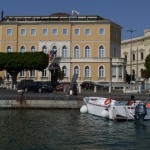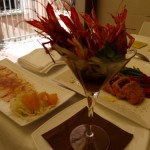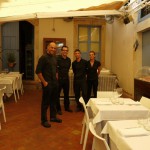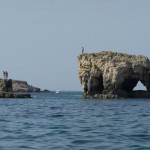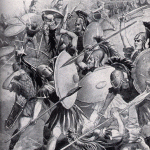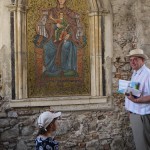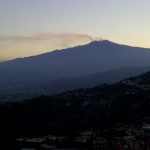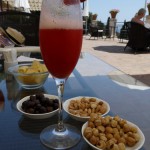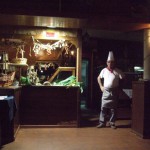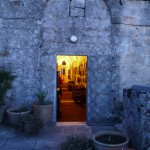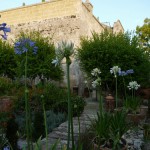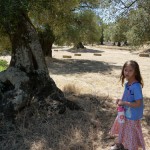Siracusa, Sicilia, 21st June
Syracuse is the most princely of cities in Sicily, where we would choose to stay if ever we had a month or two to learn Italian. There is nowhere more charming than the island of Ortygia. Besides its grand hotels and marinas, its castle on the spit, its quiet squares, fine churches and dignified palazzos, it has world class restaurants and even a fountain which is home to the water nymph Arethusa (who fled here from the advances of the river god Alpheus). And every stone drips with history. There are the remains of temples to Apollo and Diana, and an ancient bathhouse where at least one Byzantine emperor, Constans II, was assassinated. In a strange forest of grottos and caves there is a superb Greek theatre where Aeschylus put on some of his plays (‘The Persians’ was being performed again at a festival when we were there). There is a fine museum where many of Archimedes inventions have been reconstructed from his designs – and those are just the classical sites.
(Please click on thumbnails below to scroll through the galleries in this post:)
-
The Grand Hotel, Ortygia Island
(photo by Hong Ying)
-
Haute cuisine at the Per Bacco Restaurant, Ortygia Island
(photo by Hong Ying)
-
Haute cuisine at the Per Bacco Restaurant, Ortygia Island
(photo by Hong Ying)
-
Syracusans on the rocks
(photo by Hong Ying)
- Destruction of the Athenian army at Syracuse
Dominating all, however, is the grand harbour, which still retains its shape from classical times. I was advised by the historian Philip Snow to bring a copy of ‘The Peloponnesian War’ with me, because Thucydides outlines in terms as fresh as the current affairs of today the course of Athens’ doomed Sicilian Expedition of 415-413 BC in which the veteran general Nicias and the controversial statesman Alcibiades sought the submission of Syracuse as a possible first step of bringing the whole of Sicily into their Empire. From the resort hotels on the other side of the bay one can trace on the opposite shoreline the events described in the book and envision as if one were watching the television news the disastrous course of a war which turned out to be Athens’ Stalingrad or Afghanistan. In this harbour the greatest Greek expeditionary force that ever set sail was utterly destroyed, nearly every man in the expedition was killed or enslaved, and Nicias himself (Alcibiades had by then turned sides) was in the words of the historian “butchered”. I have always thought when reading “The Peloponnesian War” that it mirrors the politics of the present. One recognizes the same hubris, the same folly and wishful thinking, the same arrogance and over reach and ultimately the same shortcomings of democracy. The calm blue water of Syracuse’s harbour should have been a permanent and chilling lesson for the Powers of today when planning their Middle Eastern and Central Asian excursions during the last decade.
Taormina, Sicilia 22nd-24th June
There was a film festival on in Taormina which slightly disrupted our plans and added to the crowds, but it was fine to sit by the pool in Angela’s Hotel, high up on the cliff under the Norman fort and look down over the bay and across the way to Etna which smoked placidly and scenically through our stay. A good place to ‘chillax’, certainly difficult to match in terms of picturesqueness (though the unspoilt solitude that charmed the travelers of the 18th and 19th century is gone – by 1900, according to one contemporary and very disillusioned habitué of the Timeo hotel, who objected to the yachts of royalty spoiling the view of the harbour – though the view seemed fine enough to us when we stopped by its terrace to have a good but expensive cocktail among the beautiful people). What I did find a rather poignant irony is that this modern pleasure resort (a lot of people who visit Sicily only come for Taormina) was, in the 8th Century BC the first place in Sicily to be colonized by the Greeks. Remains of Naxos can be seen in the neighboring bay, where the cheaper tourist hotels are located. We went for a swim there, on a pebbly beach that once upon a time would have been excellent for beaching Homer’s dark prowed ships.
- Film Fest
-
Tourists
(photo by Hong Ying)
- Smoking Etna
- At the Cinque Archi Restaurant, Taormina
-
Timeo Cocktail
(photo by Hong Ying)
Bari , Puglia, 24th June
After an eight hour drive from Messina, we spent an evening in Bari eating mussels in a fish restaurant by the pier, while the locals watched Italy playing England in a football match. A television had been set up outside too and here the young boys and girls of the neighbourhood loitered through the game, not so interested in the play it seemed, but anticipating the rave though the streets on their motor bikes after victory was declared. They got their victory and the night became very noisy.
-
La Vela 2 Fish Restaurant at Bari
(photo by Hong Ying)
Il Convento della S Maria di Constantinopolo, Marittima di Diso, Puglia, 25th June
This must be the most luxurious and certainly the most interesting and beautifully appointed bed-and-breakfast in Italy, with the finest cuisine and the most charming hosts. It is a world in itself, full of curios and comforts, though if one can escape the kind hospitality, the towns around are fascinating, particularly Otranto, and there are beaches within half an hour’s drive where the water is as clear and turquoise as anywhere in Southeast Asia or the Caribbean. Lord MacAlpine is creating on the grounds of the convent a magnificent garden, which one day will perhaps become one of the sights of Southern Italy.
- Chapel of the 800 martyrs slain by the Turks
- Tree of Life in the Santa Maria Annunziata Cathedral, Otranto
-
Il Convento
(photo by Hong Ying)
-
Lord MacAlpine’s Garden
(photo by Hong Ying)
We did in fact make excursions to both Otranto and the beach. The Cathedral in Otranto is famous for its magnificent flooring which in primitive mediaeval mosaic depicts the tree of life. More curious is a side chapel where the skulls and bones of 800 martyrs are displayed in another more grisly mosaic behind glass. The story goes that the city was taken by the famous Turkish corsair, Barbarossa, in 1537. Eight hundred of the inhabitants survived the initial slaughter and were offered their lives if they converted to Islam. All refused so they were beheaded. The executioner was impressed by their faith and after fulfilling his duty said that he would like to be a Christian too, and he was therefore beheaded as well – but I could not ascertain if his head is among the 800 skulls that now stare down at us.
Masseria Il Frantoio, Ostuni, Puglia, 26th June
The best thing about this Masseria (or walled farming community compound, now a well run and comfortable hotel) are the acres of olive groves it owns. We were driven over the grounds by Giuseppe, an Englishman who works for the Masseria. Most of the trees were hundreds of years old, and their thick trunks and branches were twisted and contorted, sometimes in very life-like positions, while the silver leaves shivered diaphanously. One can imagine how the ancient Greeks evolved their idea of Dryads, or tree nymphs. They seemed to be dancing all around us.
-
Among the dryads – olive plantation at the Masseria Il Frantoio, Ostuni
(photo by Hong Ying)
To be continued…
